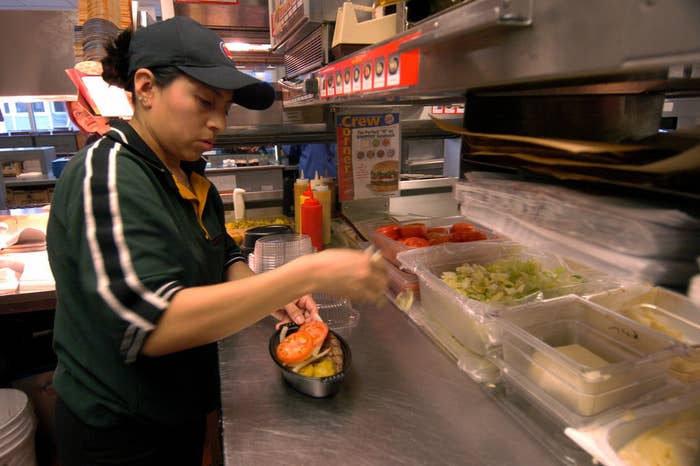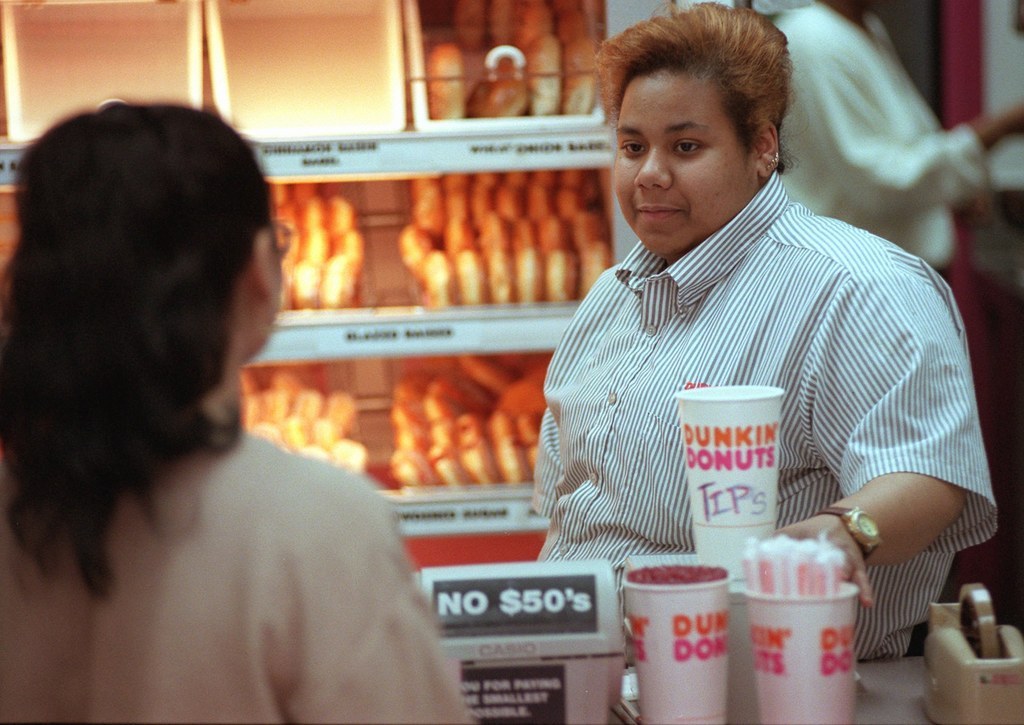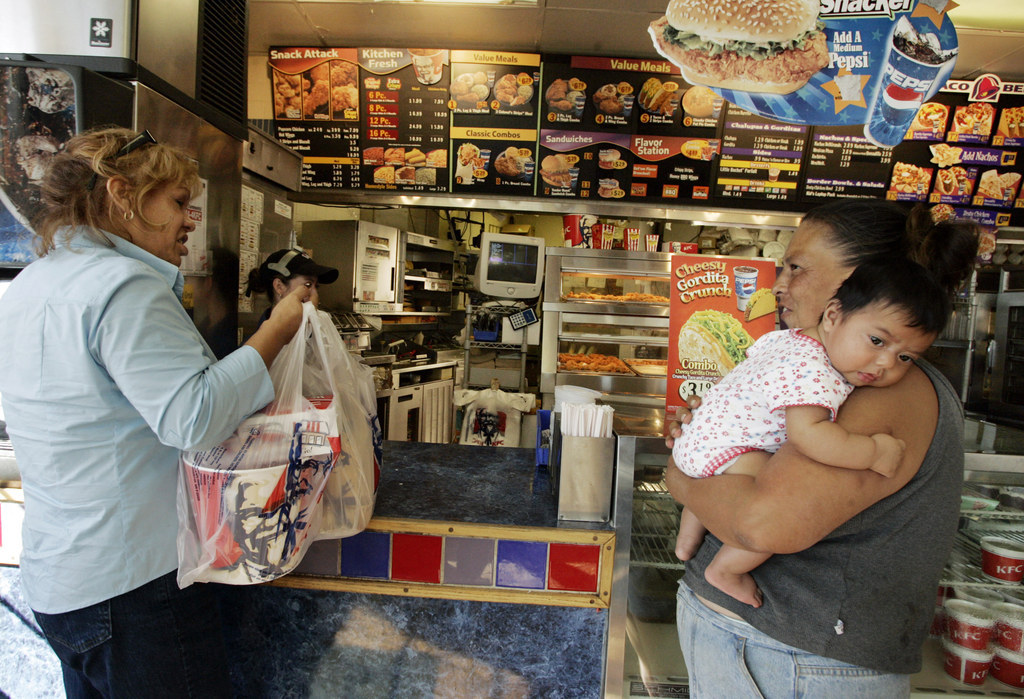
Addressing a long-debated issue, the National Labor Relations Board (NLRB) today ruled in favor of a broader definition of "joint employer," a decision that will have major implications for franchise owners and their workers in industries such as fast food and temp staffing.
Previously, franchisees were considered independent businesses, even those belonging to large chains, and the corporations that owned the brands maintained they were not responsible for working conditions at individual locations. Thursday's decision makes it easier for unions to organize franchised workplaces and to hold employers responsible for labor conditions there, including wages. The defendant in the case may still appeal the decision.
"While Congress is away, the NLRB clearly still plays," said Steve Caldeira, president and CEO of the International Franchise Association, the industry's largest trade group, in a statement following the ruling. "Today's NLRB decision is a seismic shift in the Board's employer definition and, without any Congressional or court action could significantly alter the face of American business as we know it."
As it confronts this new standard, the IFA, which represents franchise businesses large and small, including fast food giants like McDonald's, has also been contending with the "trend that can't be stopped," in the words of one professor of industrial relations — the "tidal wave" of minimum wage raises across the country, implemented by cities, states, private companies, and wage boards.
Backed by the Service Employees International Union, the Fight for 15 campaign has turned raising the minimum wage into an energetic national movement, with many of the planned increases reaching a final rate of $15 an hour, often then indexed to inflation. In New York, Gov. Andrew Cuomo's Wage Board recently recommended raising the minimum for the state's fast food workers to $15 by 2021 (and by 2018 in New York City).
Prior to the decision, BuzzFeed News spoke with Caldeira about the joint employer definition and the group's opposition to the minimum wage drive. Here's a condensed and edited transcript of the conversation.

What has the IFA's stance been on the definition of joint-employer by the NLRB?
Steve Caldeira: We've been working aggressively to educate members of Congress on both sides of the aisle to pass legislation to keep the definition of joint-employer before the board. For decades, through both Democratic and Republican administrations, the NLRB had adhered to this definition of what constitutes a joint employer.
What is your opinion of the New York Wage Board's recent recommendation to raise pay for fast food workers to $15 an hour?
SC: I think it's a blatantly discriminatory social experiment conceived by union bosses and implemented by politicians that are beholden to them. Unions have to find their bacon somewhere, and they're coming after the quick-service restaurant industry.
In me, you've got one focused, passionate CEO that is going to go toe-to-toe, punch-counterpunch against organized labor, Mary Kay Henry and the SEIU, against the blatantly discriminatory actions they are taking. We are up to the battle and we will continue to fight with all the energy that we can muster to do what's right and to protect small business franchise owners.
What would you say to supporters of the wage increase, who claim that workers can't live on the current wages in the fast food sector?
SC: The minimum wage was never meant to be a living wage. It was meant for entry-level workers — first jobs on the employment ladder, for lesser-skilled positions. A starting point, an entry point.
Today's workers aren't teens working for gas money. Almost 40% of fast food workers are 25 or older. More than a quarter of them have children.
SC: Why are more people working in quick-service industry? Because they can't get the jobs they want.
If you've got workers who are older working in quick-service restaurants, that tells you there is a fundamental problem with the policies that are emanating from Washington. If they could find the jobs they wanted, they'd be in them. But they can't. So they get the jobs where they can.
It's not the quick-service restaurant industry's fault that the U.S. economy went south. The real culprit is six years of ineffective progressive economic policies that have really impacted the small business community. It's due to a lack of a pro-growth economic agenda. You've got small business owners dealing with the Affordable Care Act, which is anything but affordable. Capital is much tougher to get.
So all of a sudden the quick-service restaurant industry is responsible for providing middle-income jobs. We were supposed to be America's training force. We provide training opportunities for veterans, minorities, and women. Franchisees want to take care of their workers, but to go from $8.75 to $15 is to blatantly discriminate against franchisees. That's why we're suing Seattle.

Do you plan to sue in New York if the labor commissioner implements the Wage Board's recommendation?
SC: Anything's possible. I can't make a judgment on behalf of our organization when a decision hasn't been rendered.
My point is that if cities and states want to raise the wage in a particular industry, that's a discussion cities and states should have with key stakeholders. This was a kangaroo court of a wage board.
They couldn't get the support through the legislative process, so they're pulling a President Obama and using executive authority to create boards and commissions that will help organized labor.
We would hope that any city or any state that is considering a minimum wage increase and that decides they want to approve the increase, would include the input of small business owners, and if in fact they made the decision to increase the minimum, that they wouldn't single out a single industry.
Would the International Franchise Association then be in favor of a minimum wage raise across all industries?
SC: If cities or states are going to consider and/or implement minimum wage increases, they should be across the board. But in my opinion, state or local governments that raise the minimum wage across the board certainly won't help the lowest wage workers keep their jobs. The solution to the lack of jobs is not a massive increase for a subset of the service industry in an attempt to turn low-level, low-income jobs into middle-class jobs.

Why do you oppose the unionization of the franchise industry?
SC: It's hard enough to run businesses without third parties coming in and trying to organize workers, in not just the quick-service restaurant business, but any business. It interferes in the workplace. It's time consuming. The quick-service industry has worked very well without unions interfering in the workplace. We believe it's unproductive when they are involved and engaged.
There's no organic movement [to raise wages] that I can see in quick-service restaurants, meaning the workers in quick-service restaurants themselves. This is all a ploy to unionize quick-service restaurants because of unions' dwindling financial coffers. It's all about unionization, collective bargaining, the things that the unions care about.
Franchise owners want to take care of their employees. The minimum wage was meant as a floor for entry-level workers, low- and lesser-skilled positions. The starting point in someone's career. I should know — I started out working at a Burger King. I worked the front of the house, back of the house, cleaned the restaurant, learned what it meant to be part of a team.
When and where was that?
SC: In Providence, Rhode Island. I grew up in Massachusetts and went to Providence College. It was probably 1980, '81. I did it part-time over a couple years. I was also an intern in the governor's office. That was an unpaid internship. So I did it for gas money, to take my girlfriend out to a movie, and have a couple beers with my buddies. That's what I needed the money for. It was a great opportunity for me.
